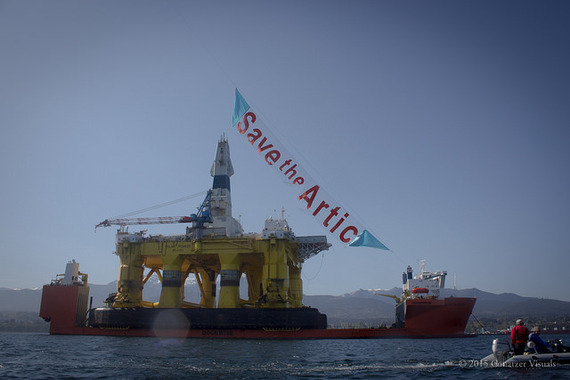Shell Oil's decision to pull the plug on drilling for oil in the Chukchi Sea is a major victory for the Arctic. This reversal is a tribute to concerted citizen action over the last several months across the country, which brought unrelenting attention to the madness of drilling for fossil fuels in the ground zero of climate change.
But make no mistake: This is not the end of oil prospects in the Arctic. It is a reprieve. And it is up to us as a nation to decide how we use it.
Will we preserve these pristine waters once and for all and accelerate the shift to cleaner energy resources? Or will we continue letting oil companies go to the ends of the earth and deepen our dependence on polluting fossil fuels?
There is no evidence Shell is interested in a different, deeply decarbonized energy future. That is not its business model. I once sat on a panel with Shell Oil President Marvin Odum where he said, "Our job is producing oil for the market. We are going to continue to do that to the best of our ability."

Protesting Shell's Arctic Destroyer drill rig as it passed through Washington in April
The company has made a $7 billion investment in the Arctic Ocean because it thought it would pay off in the long-term. The Burger J prospect was Shell's most promising option among its Chukchi Sea leases, and it came up dry. But the company collected important data about the reserve and drilling environment, and, as long as it has a lease, it could use that information to pursue future Arctic operations.
It is sobering to remember that the first dozen or so wells drilled in the deepwater of the Gulf of Mexico were dry holes too. That didn't stop companies from hammering away until they found what they were looking for. Shell already asked the Interior Department to extend its leases in the region after they run out in three years.
That's why we must seize this moment to create long-term protections.
Many environmental battles are won by delaying a destructive project long enough to change the conversation -- to allow new economic, political and social dynamics to emerge. It's happening with the Keystone XL pipeline and the Pebble Mine proposal. Now it can happen with oil development in the Arctic Ocean.
We must pivot from the fight against Shell's active drilling and focus on how to manage and protect the fragile Arctic in the face of climate change.
Photo credit: Conatzer Visuals
